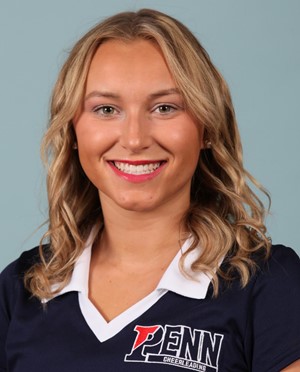Catherine Buren, NUR & WH ’25, Scotch Plains, New Jersey

This past summer, I was very fortunate to be a summer research intern as part of a research team at the Center for Health Outcomes and Policy Research here at the University of Pennsylvania School of Nursing. After a summer of virtual research due to the Covid-19 pandemic, I was grateful to be surrounded by a team of researchers who were compassionate and dedicated to helping members of the nursing community, in a professional laboratory environment which both
cultivated and encouraged new ideas.
While working under the very talented Drs. Eileen Lake and Connie Ulrich, I obtained a wealth of knowledge relating to the field of qualitative research as well as experienced the professional life of an academic nursing researcher. I worked alongside post-doctoral candidates, nurses with backgrounds in social work, and nurse researchers as well as other health sciences students, assisting with everything from clinical measurements to data entry and analysis. During my summer experience, I conducted statistical analyses and literature searches related to qualitative research which focused on nurses’ mental health and responses to moral distress. Moral distress is described as “the psychological disequilibrium, negative feeling state, and suffering experienced when nurses make a moral decision and then either do not or feel that they cannot follow through with the chosen action because of institutional constraints”. Both Drs. Ulrich and Lake focus particularly on this type of bioethics research, in which I am very interested.
I appreciated that my day to day responsibilities were always variable because I was always in a position to ask questions and learn a new skill. I was responsible for tasks including: database development and management, data entry, data collection, manuscript development, literature searches, as well as daily research team meetings. I am very thankful to have gotten first-hand experience in the field of academic nursing, a field which I first learned about through my health care management courses. Through thorough examination of interviewee files in various databases, I was able to collect nurses’ data and analyze trends based on mental health surveys collected across several different hospitals in more than six states across the country. I learned about how nurses’ mental health was affected by the Covid-19 virus, and how their decisions were affected by factors such as patient vaccination status and hospital resource shortages. It was eye opening to learn about nurses who struggled with mental health issues but continued to persevere and play an important role as essential members of the healthcare field. Nurses truly are some of the most resilient and hardworking people in the world, and I am grateful to be a part of multiple studies which aim to reduce distressing situations, improve and de-stigmatize mental health struggles in the nursing field.
I am thankful to have received a generous grant from Career Services, which I was able to use for transportation and living expenses and allowed me to maximize my experience through exposure in a research center setting. As a student who is eager to pursue a career in nursing, this clinical experience provided me with great insight into the daily life of a nurse who is also an academic researcher. From the day I was offered a position in the lab, I was welcomed by a staff with a wide range of skills and expertise and was exposed to a lot of the research process from IRB approval, all the way through to publishing a manuscript. I also want to thank Dr. Lake for adding me to the list of authors on the manuscript I worked on this summer, which means I will be a published author for the very first time!
This summer has provided me a look into what my life could look like as a nurse in an academic setting, including all the commitment and compassion this kind of career requires. I am now more confident in my decision to pursue a nursing education and am now also open to working in an academic nursing setting, like my mentor. Although the pandemic definitely impacted our research project, I was glad to be able to interact with the nurses I was interviewing at an intimate level and feel truly immersed in the nursing field. I am grateful for the opportunity from both CHOPR and Career Services and am excited to use my newfound knowledge toward my health care studies!
This is part of a series of posts by recipients of the 2022 Career Services Summer Funding Grant. We’ve asked funding recipients to reflect on their summer experiences and talk about the industries in which they spent their summer. You can read the entire series here.




